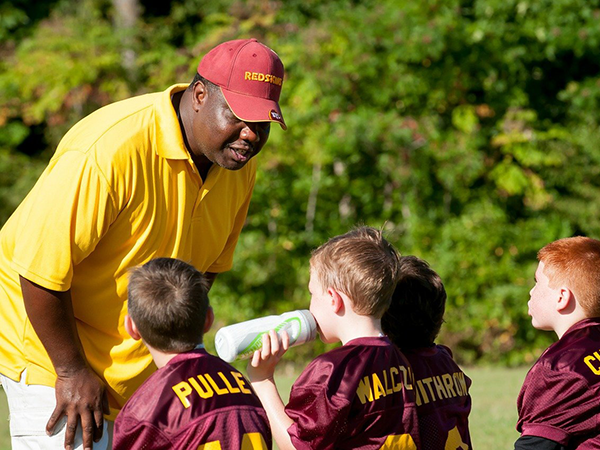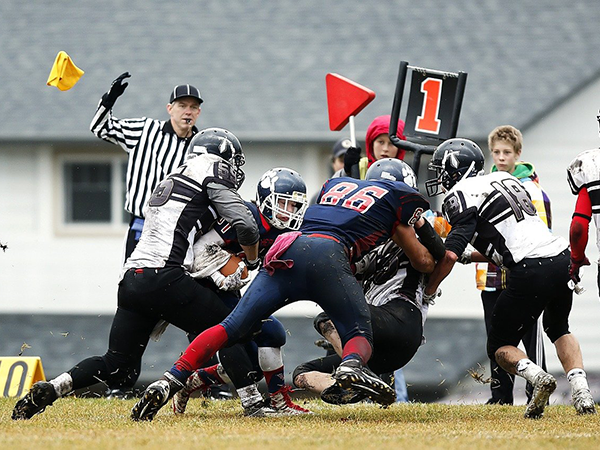Welcome to another installment of Dr. Lou’s View. I’m Dr. Lou Marciani, the director and co-founder of the Innovation Institute for Fan Experience. In this section of our newsletter, I will share my thoughts on a key issue facing the sports and entertainment industry. Today, we’re going to talk about the return of school activities like sports and clubs.
Last Wednesday, we convened a panel of academic, medical, legal, risk management, and technology thought leaders, experts, and advanced practitioners for a virtual summit addressing just that. With help from our experts, I want to lay out five key steps for the return of school sports and activities.
1. Leverage New Technology
Vaccines are available to anyone over age 12 and are being tested on younger children. The CDC recommends that everyone 12 years and older get a Covid-19 vaccine.
Talk to your doctor about vaccines as they become available to younger children and make an informed decision together. You can find vaccinations near you here.
However, vaccines are not the only new technology that can help us return to school activities. Be careful and informed when investing in such technology, though.
Kevin Wren, a school safety advocate for A3 Communication, warns school administrators, teachers, and parents not to fall for “fear tactics” in technology sales. He pointed out that some technologies, like thermal cameras for temperature checks, are often used improperly, leading to inaccurate readings.
I concur. Not using technology properly can give the appearance of safety, sometimes referred to as “hygiene theatre,” without actually providing any substantive risk avoidance. Technology companies know we all want to keep our children safe. So, make sure they don’t sell you or your organization something of dubious effect by playing on those emotions.

2. Build Meaningful Partnerships
Our conference featured a session solely devoted to building partnerships, and other speakers touched on the idea throughout the day. Here are some of my favorite tips.
School administrators and public health officials have really gotten to know one another over this tumultuous year-plus. Keep up those relationships.
Jennifer Serran, a risk management specialist for Folsom (Calif.) Unified School District. (USD), spoke during one of our sessions.
“I didn’t know who my public health officer for my county was before this, I’ll admit it. Now I know her on a first name basis,” she said. “They want to become more involved in the mental health of our students.”
Nancy Beatty, athletic director at Providence Day School (N.C.), said that her department wants to empower coaches to partner with parents and counselors in addressing mental health issues.
She wants to create a safe environment “to play, talk, learn, and be supported” on each team on her campus.

3. Get Those Partnerships Right
The spotlight is on mental health right now because the need is very high. Mental health was a recurring point of discussion during our summit.
Debbie Grace, a school psychologist who’s worked with children in the city of Denver and in Wyoming, said, “We’re looking at six-to-eight months of kids not having their needs met.”
Grace was referencing how coaches and teachers are often the first to notice problems and then file abuse and neglect reports.
The return of school sports and activities presents an opportunity to meet the needs of students with mental and emotional problems and those suffering from abuse and neglect.
She thinks that the decreased stigma surrounding mental health can provide a “new start” in addressing it among schoolchildren.
However, schools must equip coaches, teachers, and other leaders to deal with those concerns.
On the topic of risk management, Serran added, “Sports are so interactive, and they’re so good for mental health.”
Because of that interactivity, though, she adds that schools must re-emphasize mandatory reporter training for coaches.
Perris (Calif.) USD risk management and environmental safety director Judy Miller also pointed out the issue of “walk-on coaches.”
She added that these coaches are not full-time school employees, and as such, they may not get the same training on issues like mandatory reporting, she said. For instance, that type of training may take place at an in-service day only attended by school and district employees.
I share her concern. Make sure this critical training reaches everyone.
Additionally, to report an issue, coaches must be observant to see signs of one.
Dr. Til Jolly, chairman of IIFX’s medical advisory board and chief medical officer of Aveshka, Inc., says to be observant.
“If you get a hint from a kid that a kid wants to talk, the kid probably wants to talk,” he said.
So listen to them.
When talking to students, Grace said coaches should focus on “empowering communication.” They can do that by “asking the right questions and not being afraid to ask those uncomfortable questions,” she added.

4. Prepare for the Return
In addition to preparing to address mental health issues stemming from the pandemic, school leaders should prepare for logistical adjustments.
Katy (Tex.) Independent School District (ISD) assistant athletic director Lance Carter told us “collaboration by committee” is key to the return of school sports.
He said he and Houston ISD athletic director Andre Walker talk frequently to align their policies for ticketing, concessions, capacity, and more. Katy is a major Houston suburb, and the districts’ schools frequently compete against one another.
Walker said his district switched to online tickets and offered cashless concessions for the first time ever. Those changes will certainly require retraining venue staff. As I discussed in our Return to Work, Play, and Spectate guide, “skill atrophy” or “skill fade” can set in when workers and volunteers haven’t worked full-capacity events in a while.
Walker also discussed emphasizing sanitization practices to help attendees be and feel safe.
“I want people to see the cleaning. It’s okay; you don’t have to wait until people are leaving (to start cleaning),” he said to his janitorial crews.
Additionally, participants themselves must be ready to return. Cleveland Municipal Schools police captain Lamont Dodson said Ohio is allowing unlimited contact between coaches and athletes in the lead-up to the new season. This contact ensures athletes are properly conditioned and aware of all health and safety protocols.

5. Communicate
Scratch that. “Over-communicate.”
That’s the advice Grand Rapids (Mich.) Public Schools assistant superintendent of schools Larry Johnson gave our attendees, and I endorse it wholeheartedly.
“Celebrate wins,” added Montgomery County (Md.) director of systemwide athletics Dr. Jeffrey Sullivan – even the small wins.
To do so, “let the community hear from student-athletes, coaches, trainers, and county health officials,” he added.
And when you do make a mistake, own it, Sullivan concluded: “That ends up building your credibility.”
Consistency is also a key to successful communication.
Hurst-Euless Bedford (Tex.) ISD educational support services, safety, and security coordinator Robby Ball, said that messages should be “concise, clear, and full-range.”
Messages should be district- and campus-specific, and students, parents, staff, and board officials should get the same message, he added.
Communication is key to breaking down mental health concerns, clearing logistical hurdles, and making sure everyone is on the same page.
This process is difficult, and it won’t be easy, but we can all take some final words of advice from Nemo in the movie Finding Nemo.
Rockdale County (Ga.) Public Schools athletic director and head athletic trainer Kechia Rowles said she keeps telling herself, “Just keep swimming.”
That’s a great mantra to have as we work toward the all-important goal of the safe and swift return of school sports and activities.
So, keep pushing ahead in this process. It’s difficult, but children need face-to-face interaction, strong role models, and positive outlets for communication and support now more than ever.
I hope these tips from our latest event helped you in your reopening process, and I hope you enjoyed this installment of Dr. Lou’s View. Please feel free to share this article and our newsletter with others. If you have a suggestion for our next installment, email me at [email protected]. I’d love to hear from you, and I hope you’ll check out the rest of our newsletter and join me here again for the next edition of Dr. Lou’s View. If you like what you see, consider subscribing to make sure you get our latest industry insights.
Thanks for reading,

This article first appeared in our biweekly newsletter, the IIFXtra. Sign up here to get the latest from IIFX delivered straight to your inbox.
[mailmunch-form id=”1036259″]

